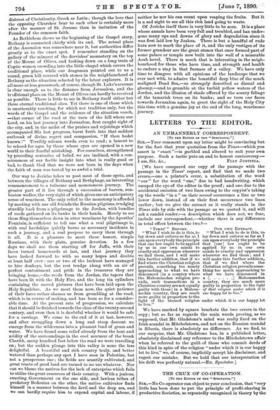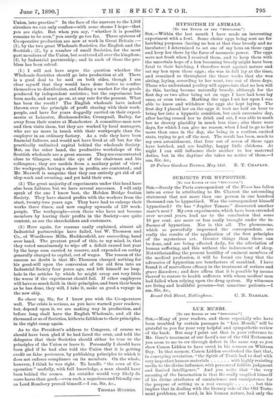THE CRUX OF 00-OPERATION.
[TO THE EDITOR OF THE "SPECTATOR."]
SIR,—No Co-operator can object to your conclusion, that "very little has been done to put the principle of profit-sharing in productive Societies, so repeatedly recognised in theory by the
Union, into practice." In the face of the answers to the 1,503 circulars we can only confess—with some shame I hope—that you are right. But when you say, "whether it is possible remains to be seen," you surely go too far. Three systems of Co-operative production are now at work in Great Britain :— (1), by the two great Wholesale Societies, the English and the Scottish ; (2), by a number of small Societies, for the most part members of the Union, but scattered all over the kingdom; (3), by Industrial partnership; and in each of these the pro- blem has been solved.
(1.) I will not here argue the question whether the Wholesale Societies should go into production at all There is a good deal to be said on both sides, though I am clear myself that they would have done better to confine themselves to distribution, and finding a market for the goods produced by independent societies ; but the experiment has been made, and must go on, at any rate for the present. What has been the result? The English wholesale have indeed thrown over the principle of profit sharing with their work- people, and have for years doggedly carried on their experi- ments at Leicester, Heckmondwike, Crampoon, Batley, far away from their centre at Manchester. A committee-man now and then visits them, but they are worked by local managers, who are no more in touch with their workpeople than the employer in an ordinary factory. As a rule they have been financial failures, and would not have lived at all but for the practically unlimited capital behind the wholesale Society. But, on the other hand, the productive workshops of the Scottish wholesale are a great success. They are concentrated close to Glasgow, under the eye of the chairman and his colleagues ; they are models from a sanitary point of view ; the workpeople, having a share in profits, are contented ; and Mr. Maxwell is sanguine that they can entirely get rid of all slop-work and sweating, and yet hold their own.
(2.) The great majority of experiments under this head have also been failures, but we have several successes. I will only speak of the one I know best, the Hebden Bridge fustian Society. They have shared profits with the workers from the -start, twenty-two years ago. They have had to enlarge their works three times, and now employ upwards of 120 work- people. The workpeople—even those who have not become members by leaving their profits in the Society—are quite content, as are the shareholders and customers.
(3.) Here again, for reasons easily explained, almost all Industrial partnerships have failed, but W. Thomson and Co., of Woodhouse Mills, Huddersfield, are succeeding, hand over hand. The greatest proof of this, to my mind, is, that they voted unanimously to wipe off a deficit caused last year by the large sum carried to reserve, and expended on outlay generally charged to capital, out of wages. The reason of the success no doubt is that Mr. Thomson charged nothing for his good-will upon the conversion of the old firm into an Industrial Society four years ago, and left himself no loop- hole in the articles by which he might creep out very little the worse if the experiment should fail. If other employers will have as much faith in their principles, and burn their boats as he has done, they will, I take it, make as good a voyage in the new ship.
So cheer up, Sir, for I know you wish the Co-operators well. The crisis is serious, as you have warned your readers; but, depend upon it, we are making way in production, and before long shall have the English Wholesale, and all the thousand or so of Societies, hitherto faithless to their principles, in the right camp again.
As to the President's address to Congress, of course we should have been glad if he had faced the crux, and told the delegates that their Societies should either be true to the principles of the Union or leave it. Personally I should have been glad if he had also told the Union that it is getting credit on false pretenees, by publishing principles to which it .does not enforce compliance on its members. On the whole, however, I think he was right. To handle "the crux of Co- operation " usefully, with full knowledge, a man should have been behind the scenes. An outsider would very likely do more harm than good,—even such a sagacious and friendly one as Lord Rosebery proved himself.—I am, Sir, &c.,
THOMAS HUGHES.





































 Previous page
Previous page